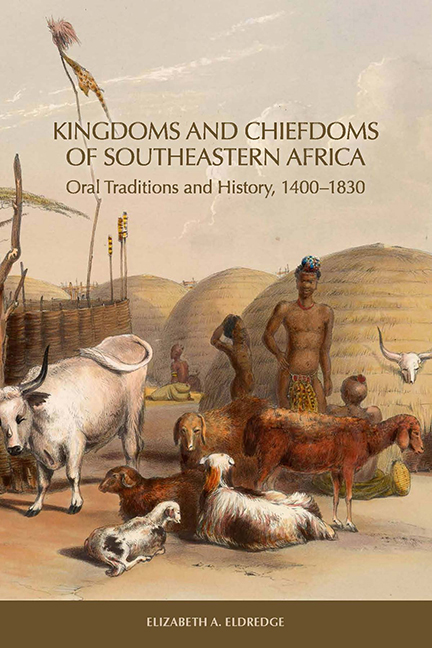Book contents
- Frontmatter
- Contents
- List of Illustrations
- Preface
- 1 History and Oral Traditions in Southeastern Africa
- 2 Oral Traditions in the Reconstruction of Southern African History
- 3 Shipwreck Survivor Accounts from the Sixteenth and Seventeenth Centuries
- 4 Founding Families and Chiefdoms East of the Drakensberg
- 5 Maputo Bay Peoples and Chiefdoms before 1740
- 6 Maputo Bay, 1740–1820
- 7 Eastern Chiefdoms of Southern Africa, 1740–1815
- 8 Zulu Conquests and the Consolidation of Power, 1815–21
- 9 Military Campaigns, Migrations, and Political Reconfiguration
- 10 Ancestors, Descent Lines, and Chiefdoms West of the Drakensberg before 1820
- 11 The Caledon River Valley and the BaSotho of Moshoeshoe, 1821–33
- 12 The Expansion of the European Presence at Maputo Bay, 1821–33
- 13 Southern African Kingdoms on the Eve of Colonization
- Appendix A Ama Swazi King Lists
- Appendix B Chronology of Conflicts, Migrations, and Political Reconfiguration East of the Drakensberg in the Era of Shaka
- Appendix C Interviewees from the James Stuart Collection of Oral Traditions
- Notes
- Bibliography
- Index
8 - Zulu Conquests and the Consolidation of Power, 1815–21
Published online by Cambridge University Press: 14 March 2018
- Frontmatter
- Contents
- List of Illustrations
- Preface
- 1 History and Oral Traditions in Southeastern Africa
- 2 Oral Traditions in the Reconstruction of Southern African History
- 3 Shipwreck Survivor Accounts from the Sixteenth and Seventeenth Centuries
- 4 Founding Families and Chiefdoms East of the Drakensberg
- 5 Maputo Bay Peoples and Chiefdoms before 1740
- 6 Maputo Bay, 1740–1820
- 7 Eastern Chiefdoms of Southern Africa, 1740–1815
- 8 Zulu Conquests and the Consolidation of Power, 1815–21
- 9 Military Campaigns, Migrations, and Political Reconfiguration
- 10 Ancestors, Descent Lines, and Chiefdoms West of the Drakensberg before 1820
- 11 The Caledon River Valley and the BaSotho of Moshoeshoe, 1821–33
- 12 The Expansion of the European Presence at Maputo Bay, 1821–33
- 13 Southern African Kingdoms on the Eve of Colonization
- Appendix A Ama Swazi King Lists
- Appendix B Chronology of Conflicts, Migrations, and Political Reconfiguration East of the Drakensberg in the Era of Shaka
- Appendix C Interviewees from the James Stuart Collection of Oral Traditions
- Notes
- Bibliography
- Index
Summary
When Shaka returned to the AmaZulu chiefdom from the AmaMthethwa chiefdom with an entourage and usurped the chieftaincy, he remained subordinate to Chief Dingiswayo, who retained paramountcy across smaller chiefdoms in the vicinity of the AmaMthethwa. Several smaller chiefdoms had already offered submission to Shaka's father, Senzangakona, and Shaka himself had retained strong links with the AmaLanga chiefdom of his mother, including many prominent people of eLangeni who had taken refuge with him in Dingiswayo's growing kingdom. In spite of his contentious relationship with his maternal cousin Makedama, the eLangeni people were the first to come under the AmaZulu chiefdom as Shaka widened the control that his father had already begun to extend. The few small chiefdoms that recognized the authority of Senzangakona, such as the AmaMpongose, also khonza'd the new AmaZulu chief Shaka. But Shaka had already earned a reputation that caused the smaller chiefs to worry about the fate of their people, and their diviners foretold disaster:
When people heard that Tshaka had become king, Ngoza of the Tembu people, and Macingwane, and then Matiwane, all fLed. Matiwane went along the Drakensberg. On the way some of his people lost toes from the cold. Tshaka had not yet made war; he had not yet fought with Zwide. They saw him in the isitundu medicines (medicines made by the diviners for the king to wash with). Diviners in those days still had medicines, unlike those of today, who collect money and doctor with nothing.
The Ama Ngwane, under their chief Matiwane, appear to have fLed first after suffering defeat in a joint attack by the forces of Dingiswayo and Shaka. Matiwane's people were set into fLight again by Shaka a few years later, and in the interim other chiefs had also led their people in an exodus southward. Although his dates are questionable, Shepstone appears to be the most accurate of the sources for early Ama Ngwane history, and he explained that they were settled in the northwestern part “of the present Zululand” until they were attacked by Dingiswayo, who was assisted by the forces of his subordinate chief Shaka.
- Type
- Chapter
- Information
- Kingdoms and Chiefdoms of Southeastern AfricaOral Traditions and History, 1400–1830, pp. 185 - 206Publisher: Boydell & BrewerPrint publication year: 2015



